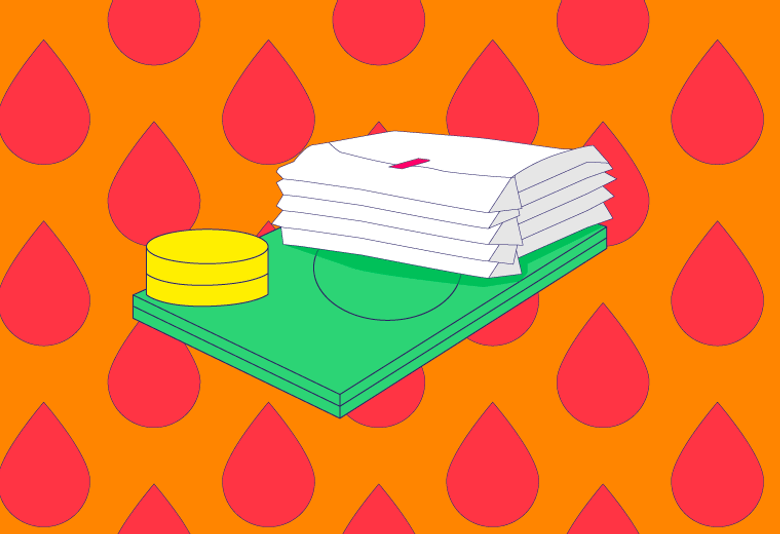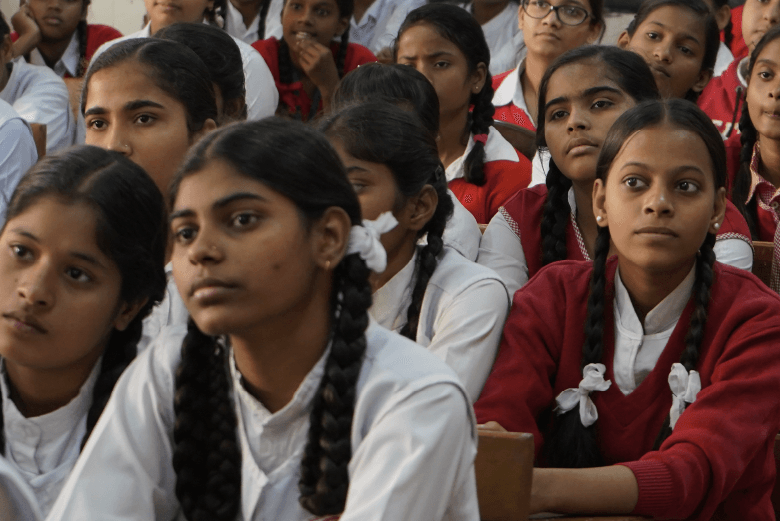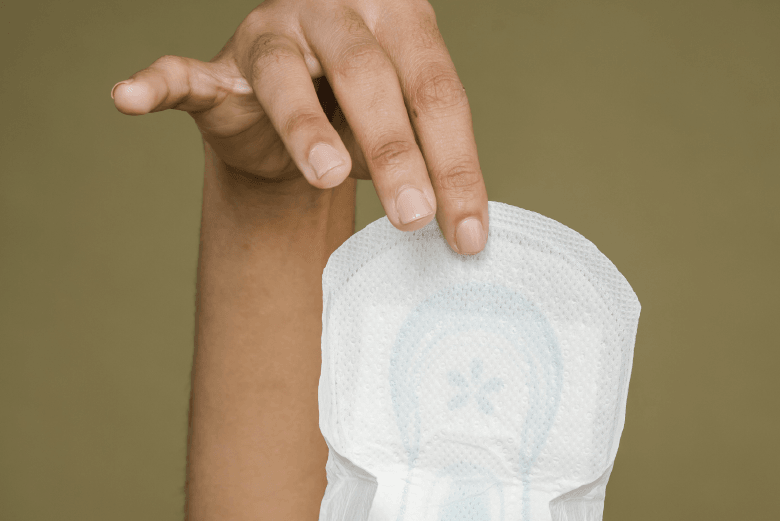Around 800 million people around the world menstruate. This implies, as vagina owners reach their reproductive age, their uterus sheds tissues and blood. This is an extremely natural process and is referred to as menstruation or “the period”. In order to manage this period stress free, people need access to resources, environment and policies that help them to do so. However, these basic necessities are not being met across different sections of population, leading to a condition called period poverty.
What causes period poverty?
Period Poverty can occur due to economic vulnerability, poor hygiene and lack of awareness and access to menstrual management resources. On several occasions, this can be due to inadequate access to washing facilities, waste management and sanitary products. Thus, affecting disadvantaged and low income households the most around the world.
Note: our blog about menstrual products can interest you.
What exactly is the problem with period poverty?
Poor menstrual hygiene can lead to urinary infections and reproductive health diseases. Period Poverty can also stop people from reaching their full potential as they miss opportunities that are important for their growth. Studies have shown that it keeps girls and the workforce away from schools and places of work due to a lack of education and access to menstrual management products.
How are different countries addressing Period Poverty?
Scotland, in 2020, was the first country to pass a bill that had provisions to make period products accessible and free of cost for all. New Zealand and Botswana decided to roll out an option to provide free period products to students in 2021 and 2017 respectively. Kenya, in 2017, passed laws that would remove the tax on tampons and period products. Zambia decided to reduce the inequity in access to period products among rural communities by providing free products for girls to manage their menstrual cycle. A few work-places around the world are allowing menstruators to take mandatory leaves or provide alternatives to work from the comfort of their home during their menses.
Does mere access to menstrual products solve Period Poverty?
Access to menstrual products is a step towards solving Period Poverty. However, it is not an all-encompassing solution. Some countries have legislation for providing free sanitary napkins, however, there are loopholes in the execution. Thus, these products do not timely reach menstruators. Moreover, even after making these products tax exempted, not everyone can afford them, especially citizens of less developed and developing countries. In addition to removing barriers on access to period products, education on menstrual hygiene, having sanitation facilities and a stigma- free environment are important factors to end Period Poverty.
The role of Stigma and Period Poverty
Stigma keeps women, girls and people of other genders who menstruate away from achieving their full potential. In some countries, stigma keeps them from going to school and carrying out daily tasks, like cooking, cleaning etc. Often, they are not allowed to enter the home kitchen. Especially due to cultural barriers, often, rural women from some South Asian countries are forbidden from entering the kitchen, for it’s a boon as they get adequate time to rest.
However, for some, they are considered “dirty”. In reality, menstruation needs to be normalised and advocacy initiatives that break the stigma associated with it need encouragement.
How important are sanitation facilities in accessing period poverty?
One in four people around the world do not have access to toilet facilities. Also, it is estimated that 11% do not have clean water near their settlements. Thus, a significant percentage of people cannot manage their period due to the unhygienic conditions around them. Outside one’s home, the ratio of public toilets to that of the total population residing in that particular area is significantly low, Thus, one may have to wait in a queue or long hours for accessing a toilet facility.
Moreover, not all public toilets are accessible and sensitive towards all genders. Thus, expanding the period poverty gap. Some people are scared to use period products in public settings, due to the stigma of it smelling or clothes getting stained.
Role of education in ending Period Poverty
All over the world, girls and other menstruators lack the knowledge, resources and education at the onset of their first period. This time can be confusing and lack of knowledge on the same will lead to shame and fear. Therefore, awareness programs that impart timely education on menstrual hygiene are an important step. Not just menstruators but people of other genders are important stakeholders, who need to be educated to help break the stigma around menstruation.
In addition, these programs need to be inclusive for all genders of menstruators Education on menstrual hygiene plays a vital roles to break harmful myths like the onset of the first period, that, “the person is now sexually mature or is ready for marriage” too.
Period Poverty and the Environment
Most of the readily available period products are made up of polyesters, synthetic fibres or plastic. Therefore, these products are non-biodegradable and contribute towards environment pollution. Sustainable alternatives, such as cups and cloth pads need to be promoted and made available to all sections of the society at affordable prices.
Hence, as we are grappling with environmental concerns regarding disposal of period products, it is essential that implementation agencies and governments look into this concern to bridge the period poverty gap. It is worth noting that the bodies of all menstruators are different, and not every period product is suitable for all.
Measures to tackle Period Poverty
There is a dire need to initiate conversations and build inclusive awareness programs that are not gender binary. Equal support needs to be lent to every menstruator, irrespective of their gender. Following by, creating adequate resources and removing financial barriers to accessing them so that they reach every person, irrespective of socioeconomic status or gender. We need to adopt a holistic approach to eradicate period poverty, by creating adequate sanitation facilities so that people can access them during the days they are menstruating without having to worry about a basic human right being met.
Moreover, safe spaces need to be created at different levels like home, education institutions and workplaces that won’t stigmatise periods are a vital step. We need to work collectively with menstruators, menstrual health activists, medical health practitioners and government agencies to carry out structural changes within the menstrual health policies and work towards implementing intersectional awareness programs that adopt a gender lens in formulating them to eradicate period poverty.
Focus on providing timely menstrual health care packages to all menstruators who need them is required. Most importantly, these initiatives need implementation on the ground that ensure accessibility and education that reaches vulnerable and disadvantaged groups.
References:
- Menstruation and human rights, UNFPA: https://www.unfpa.org/menstruationfaq#:~:text=Period%20poverty%20describes%20the%20struggle,burden%20posed%20by%20menstrual%20supplies
- Everything you need to know about period poverty, Global Citizen: https://www.globalcitizen.org/en/content/period-poverty-everything-you-need-to-know/
- Let’s talk about menstrual hygiene,UNDispatch: https://www.undispatch.com/lets-talk-about-menstrual-hygiene/
- Period Stigma, IPPF: https://www.ippf.org/blogs/period-stigma-how-it-holds-back-girls-and-women
- The Global Fight against Period Poverty, We forum, https://www.weforum.org/agenda/2022/06/period-poverty-pain-stigma/
About the Author: Pragati Khabiya is an independent consultant from India, passionate about using the tools of communication, advocacy, and facilitation to work for the development sector. She could only discover what she is passionate about after spending time volunteering and travelling by herself at remote organisations in India. She believes in the process of unlearning and likes to read/watch feminist films and books.
Do you have something to share? Leave your comments below, contact us on our social media platforms: Facebook, Instagram, Twitter, YouTube and TikTok, send us an email to info@findmymethod.org. For more information on contraception, visit findmymethod.org.



